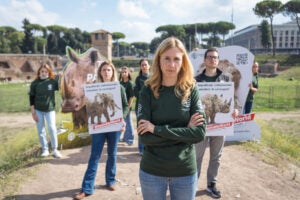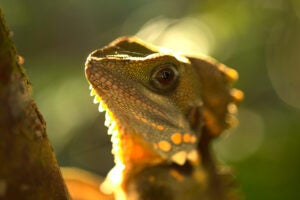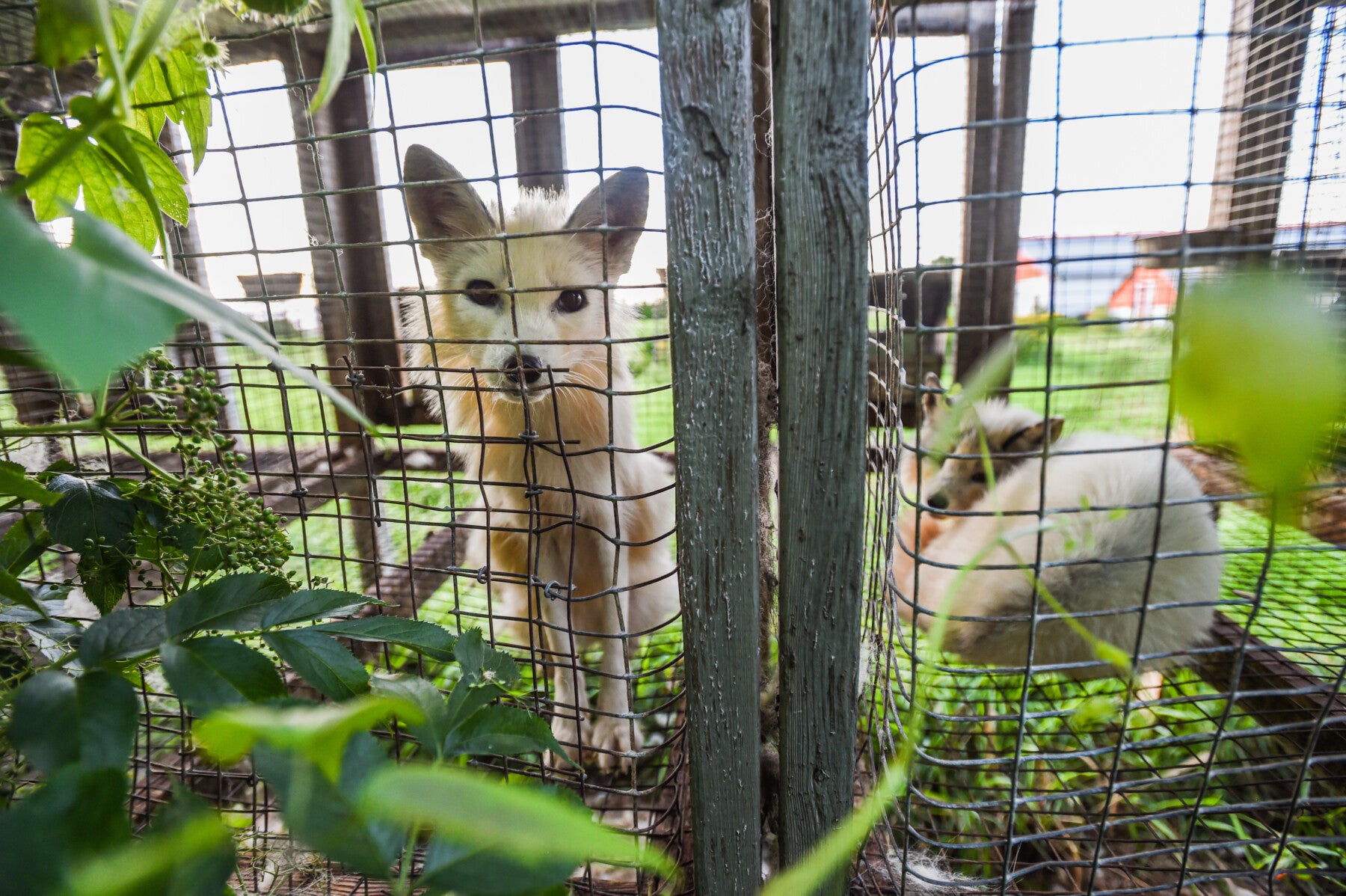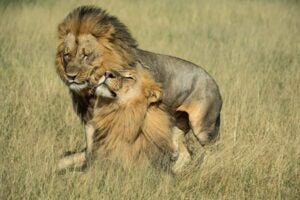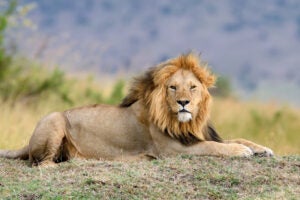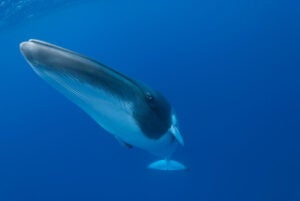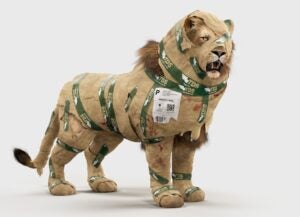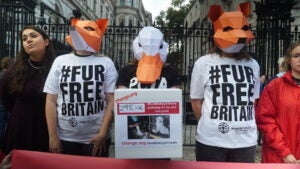
LONDON—A week after a senior Conservative MP told Politico that the government intends to drop plans to ban cruel fur and foie gras, campaigners from animal NGOs Humane Society International/UK, FOUR PAWS UK, and PETA have gathered outside Downing Street to hand in a petition with over 300,000 signatures. Launched earlier this year by TV conservationist Chris Packham, the petition was today handed in to Prime Minister Liz Truss calling on her to end the “obscene double-standard” that allows these products of cruelty to be imported and sold in UK shops. The petition is also delivered just days after wildlife and conservation groups including the National Trust and the Royal Society for the Protection of Birds accused Liz Truss of “an attack on nature” for weakening environmental rules.
Fur farming has been banned on ethical grounds across the UK since the Fur Farming (Prohibition) Act came into force in 2003, and force feeding of geese and ducks to produce pâté de foie gras is similarly illegal. However, the UK currently permits trade in both fur and foie gras. Since the fur farming ban took effect, His Majesty’s Revenue and Customs records indicate that almost one billion pounds worth of cruel fur has been imported from countries including China, Italy, Finland and Poland. The petition urges Liz Truss to “send a global message that we will not trade in such disgusting cruelty.”
In May 2021 the government launched a Call for Evidence on the UK fur trade, with the stated intention of using the findings to inform possible future action. The consultation had received almost 30,000 responses when it closed in June 2021. The Department for Environment, Food and Rural Affairs has completed its analysis of the results but despite Ministers publicly confirming these findings would be released, it has still failed to do so more than a year later.
In parallel with the petition hand-in, Shadow Animal Welfare Minister Ruth Jones MP and Liberal Democrat Environment Spokesperson Tim Farron MP have sent letters to Defra Secretary of State Ranil Jayawardena, each stating their party’s support for a fur import and sales ban and urging the government to release the findings of the Call for Evidence.
Ruth Jones MP said: “It was a Labour government that banned fur farming in 2000, blazing a trail that now 18 other countries have followed. Untold millions of animals have been spared lives of misery thanks to these bans. The next logical step is for the UK to lead the way on a fur import ban, closing UK borders to the cruel and dangerous fur trade. Government policy should be based on evidence, so surely it should be a simple job for the results of the Call for Evidence to be released and an informed policy position to be taken. Drip-feeding unevidenced U-turns to the press is a dismal way to run the government.”
Tim Farron MP said: “We are a nation of animal lovers, and how we treat animals is a measure of our humanity. The Liberal Democrats stand firm on animal welfare issues and are proud to support calls to end the UK’s complicity in the cruel global fur trade by banning the import and sale of fur.”
Each year more than 100 million animals suffer and die for their fur, the majority (around 95%) spending their entire lives trapped in barren wire cages measuring just one metre square. Injuries and disease are common on fur farms, as are animals displaying signs of psychological distress.
Chris Packham said: “There is no place in modern Britain for fur or foie gras, both of which are products of appalling cruelty. We don’t allow the freedom of choice to import elephant ivory, or whale meat, or seal, dog or cat fur, because all these things are unutterably immoral. So too is causing animals enormous pain and suffering for frivolous fur and foie gras.”
Claire Bass, executive director of Humane Society International/UK, said: “Almost 80% of British people agree that fur should not be imported and sold here, and given fur’s plummeting popularity with designers and retailers, it certainly isn’t going to be playing any part in the prime minister’s ambitions for booming economic growth. Moving ahead with a fur ban is an opportunity to reassure people that the government’s trade strategy has a moral compass, in line with voters’ expectations. No government should underestimate how much animals matter to the British people, and ending trade in products so cruel their production is already banned here, is an easy way for Liz Truss to demonstrate she understands that.”
Sonul Badiani-Hamment, FOUR PAWS UK country director, said: “Given Liz Truss’s determination to recklessly backpedal on every commitment made to British voters, we are uniting with Chris Packham and the opposition parties to send a firm message to Downing Street that we will be the thorn in their side until they start delivering for animals. We’re demanding they make public the responses to the 2021 UK fur trade Call for Evidence. But for this government, that seem to have forgotten their electoral mandate and to whom they answer, even a request for a transparent evidence-based approach is too much. Animals Matter to our climate, our health, our economy and to us, the British public, and we will not allow Liz Truss and her cabinet to forget this.”
Elisa Allen, PETA vice president of programmes, said: “The government has long promised to close our borders to cruelly produced foie gras and fur by implementing an import ban on both—legislation that is welcomed by everyone in this country except the inherently selfish. Any backtrack on these promises would betray both animals who desperately need a caring and the public, which has made its opposition to these items clear.”
National polling carried out in April 2022 shows that over three quarters (77%) of British voters think the government should ban the importation of animal products where the production methods are already banned in the UK, such as fur.
The petition hand-in comes as across Europe, more than 70 NGOs have joined together to support the “Fur Free Europe” European Citizens’ Initiative which calls for an EU-wide ban on fur farming and the import of fur products. The ECI petition was launched in May this year and has gathered more than 336,000 signatures to date.
ENDS
Notes: Polling was run on the Focaldata platform. Data was collected from a nationally representative sample of 10,018 adults between 11th and 20th April 2022.
Media contact: Sally Ivens, senior media manager, HSI/UK: sivens@hsi.org

